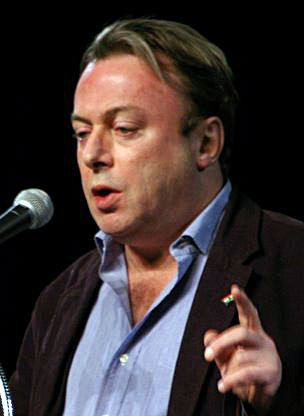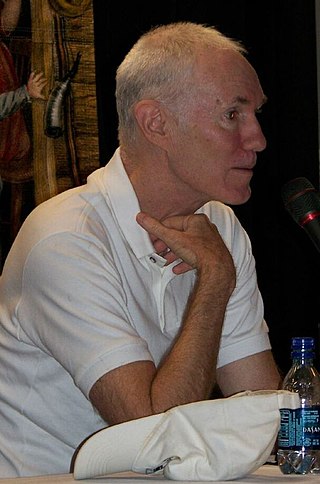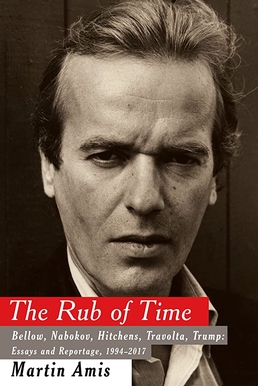
Christopher Eric Hitchens was a British and American author, journalist, and educator. Author of 18 books on faith, culture, politics and literature, he was born and educated in Britain, graduating in the 1970s from Oxford with a degree in Philosophy, Politics and Economics. In the early 1980s, he emigrated to the United States and wrote for The Nation and Vanity Fair. Known as "one of the 'four horsemen'" of New Atheism, he gained prominence as a columnist and speaker. His epistemological razor, which states that "what can be asserted without evidence can also be dismissed without evidence", is still of mark in philosophy and law.

The Missionary Position: Mother Teresa in Theory and Practice is a book by the journalist and polemicist Christopher Hitchens published in 1995. It is a critique of the work and philosophy of Mother Teresa, the founder of an international Roman Catholic religious congregation, and it challenges the mainstream media's assessment of her charitable efforts. The book's thesis, as summarized by one critic, was that "Mother Teresa is less interested in helping the poor than in using them as an indefatigable source of wretchedness on which to fuel the expansion of her fundamentalist Roman Catholic beliefs."

The London Review of Books (LRB) is a British literary magazine published bimonthly that features articles and essays on fiction and non-fiction subjects, which are usually structured as book reviews.

Christopher Taylor Buckley is an American author and political satirist. He also served as chief speechwriter to Vice President George H. W. Bush. He is known for writing God Is My Broker, Thank You for Smoking, Little Green Men, The White House Mess, No Way to Treat a First Lady, Wet Work, Florence of Arabia, Boomsday, Supreme Courtship, Losing Mum and Pup: A Memoir, and The Judge Hunter.

Colm Tóibín is an Irish novelist, short story writer, essayist, journalist, critic, playwright and poet.

The Master is a novel by Irish writer Colm Tóibín. His fifth novel, it received the International Dublin Literary Award, the Stonewall Book Award, the Lambda Literary Award, the Los Angeles Times Novel of the Year and, in France, Le prix du meilleur livre étranger in 2005. It was also shortlisted for the 2004 Booker Prize

The Heather Blazing is the 1992 novel by Irish writer Colm Tóibín. It was the writer's second novel and allowed him to become a full-time fiction writer. The intensity of the prose and the emotional tension under the colder eye with which the events are seen, provided him with a faithful readership both at home and abroad. It won the 1993 Encore Award for a second novel. The novel takes its title from a line from the song "Boolavogue", specifically "a rebel hand set the heather blazing".

Andrew Holleran is the pseudonym of Eric Garber, an American novelist, essayist, and short story writer, born on the island of Aruba. Most of his adult life has been spent in New York City, Washington, D.C., and a small town in Florida. He was a member of The Violet Quill with Christopher Cox, a gay writer's group that met in 1980 and 1981 and also included Robert Ferro, Edmund White and Felice Picano. Following the critical and financial success of his first novel Dancer from the Dance in 1978, he became a prominent author of post-Stonewall gay literature. Historically protective of his privacy, the author continues to use the pseudonym Andrew Holleran as a writer and public speaker.

Love, Poverty, and War: Journeys and Essays is a collection of essays and reportage by the author, journalist, and literary critic Christopher Hitchens. The title of the book is explained in the introduction, which informs the reader that "an antique saying has it that a man's life is incomplete unless or until he has tasted love, poverty, and war."

Letters to a Young Contrarian is Christopher Hitchens' contribution, released in 2001, to the Art of Mentoring series published by Basic Books.
Anthony Haden-Guest is a British-American writer, reporter, cartoonist, art critic, poet, and socialite who lives in New York City and London. He is a frequent contributor to major magazines and has had several books published.

Christopher Hitchens was a British and American author, polemicist, debater and journalist who in his youth took part in demonstrations against the Vietnam War, joined organisations such as the International Socialists while at university and began to identify as a socialist. However, after 9/11 he no longer regarded himself as a socialist and his political thinking became largely dominated by the issue of defending civilization from terrorists and against the totalitarian regimes that protect them. Hitchens nonetheless continued to identify as a Marxist, endorsing the materialist conception of history, but believed that Karl Marx had underestimated the revolutionary nature of capitalism. He sympathized with libertarian ideals of limited state interference, but considered libertarianism not to be a viable system. In the 2000 U.S. presidential election, he supported the Green Party candidate Ralph Nader. After 9/11, Hitchens advocated the invasion of Iraq. In the 2004 election, he very slightly favored the incumbent Republican President George W. Bush or was neutral and in 2008 he favored the Democratic candidate Barack Obama over John McCain despite being critical of both of them.

Christopher Hitchens was a prolific British and American author, political journalist and literary critic. His books, essays, and journalistic career spanned more than four decades. Recognized as a public intellectual, he was a staple of talk shows and lecture circuits. Hitchens was a columnist and literary critic at The Atlantic, Vanity Fair, Slate, World Affairs, The Nation, Free Inquiry, and a variety of other media outlets.

Human Chain is the twelfth and final poetry collection by Seamus Heaney. It was first published in 2010 by the Faber and Faber.

The Best American Magazine Writing 2007 is a non-fiction book published by Columbia University Press, and edited by the American Society of Magazine Editors. It features recognized high-quality journalism pieces from the previous year. The book includes an account by journalist William Langewiesche of Vanity Fair about a controversial United States military operation in Iraq, an investigative journalism article for Rolling Stone by Janet Reitman, a piece published in Esquire by C.J. Chivers about the Beslan school hostage crisis, and an article by Christopher Hitchens about survivors of Agent Orange.

Arguably: Essays is a 2011 book by Christopher Hitchens, comprising 107 essays on a variety of political and cultural topics. These essays were previously published in The Atlantic, City Journal, Foreign Affairs, The Guardian, Newsweek, New Statesman, The New York Times Book Review, Slate, Times Literary Supplement, The Wall Street Journal, The Weekly Standard, The Wilson Quarterly, and Vanity Fair. Arguably also includes introductions that Hitchens wrote for new editions of several classic texts, such as Animal Farm and Our Man in Havana. Critics' reviews of the collection were largely positive.

Hitch-22: A Memoir is a memoir written by author and journalist Christopher Hitchens.

Human Smoke: The Beginnings of World War II, the End of Civilization is a 2008 book by Nicholson Baker about World War II. It questions the commonly held belief that the Allies wanted to avoid the war at all costs but were forced into action by Adolf Hitler's aggression. It consists largely of official government transcripts, newspaper articles, and other documents from the time, with Baker only occasionally interjecting commentary. Baker cites documents that suggest that the leaders of the United States and the United Kingdom were provoking Germany and Japan into war and had ulterior motives for participating. He dedicates the book to American and British pacifists of the time who, he states in the book's epilogue, were right all along: "They failed, but they were right."
Barbara Leaming is an American biographer, whose subjects have included Roman Polanski, Orson Welles, Rita Hayworth, Marilyn Monroe, John F. Kennedy, Winston Churchill, and Jacqueline Kennedy Onassis.

The Rub of Time: Bellow, Nabokov, Hitchens, Travolta, Trump: Essays and Reportage, 1994–2017 is a 2017 collection of non-fiction essays and criticism by the British author Martin Amis. It was his eighth nonfiction book and the final collection published during his lifetime.

















